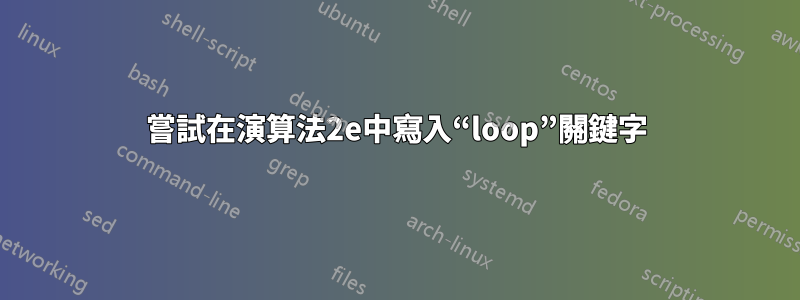
我在用著演算法2e我需要使用loop此處出現的關鍵字:
[![在此輸入影像描述][1]][1]
微量元素
documentclass{article}
\usepackage{xcolor}
\usepackage[linesnumbered,ruled,vlined]{algorithm2e}
%%% Coloring the comment as blue
\newcommand\mycommfont[1]{\footnotesize\ttfamily\textcolor{blue}{#1}}
\SetCommentSty{mycommfont}
\SetKwInput{KwInput}{Input} % Set the Input
\SetKwInput{KwOutput}{Output} % set the Output
\begin{document}
\maketitle
\begin{algorithm}[H]
\DontPrintSemicolon
\KwInput{Your Input}
\KwOutput{Your output}
\KwData{Testing set $x$}
$\sum_{i=1}^{\infty} := 0$ \tcp*{this is a comment}
\tcc{Now this is an if...else conditional loop}
\If{Condition 1}
{
Do something \tcp*{this is another comment}
\If{sub-Condition}
{Do a lot}
}
\ElseIf{Condition 2}
{
Do Otherwise \;
\tcc{Now this is a for loop}
\For{sequence}
{
loop instructions
}
}
\Else
{
Do the rest
}
\tcc{Now this is a While loop}
\While{Condition}
{
Do something\;
}
\caption{Example code}
\end{algorithm}
\end{document}
答案1
我現在發現了這個包,並且在文檔中,有一些巨集允許您定義自己的關鍵字。
有一些定義了循環,但它們在循環的末尾或開頭添加了停止測試。
所以我選擇了定義塊的宏,因為停止測試是在循環結束之前給的。\SetKwBlock{Loop}{Loop}{end}
第一個參數定義了巨集的名稱,因此如果您使用大寫字母{Loop},則在呼叫時也必須這樣做:\Loop。如果用小寫字母書寫{loop},則必須呼叫\loop。第二個參數是關鍵字在演算法中的顯示方式。
我引用第35頁的手冊:
\SetKwBlock{開始}{開始}{結束}定義一個巨集\開始{txt}表示一個塊。文字被文字包圍開始和結尾在關鍵字排版中並向右移動(縮排)。在\V線 或者 \線 模式添加一條垂直直線。\開始(側面文字){文字}也給出了包圍在區塊中的文本開始和結尾, 但旁白如果放在後面開始關鍵字。結合\tcc*[f] 宏,它允許您將註釋放在與開始。您也可以使用替代方案\u開始{txt}它充當\開始{txt}但沒有結尾。例如,作為一個不需要的部分分隔符號很有用結尾關鍵字。
\documentclass{article}
\usepackage{xcolor}
\usepackage[linesnumbered,boxruled,ruled,noline]{algorithm2e}
%%% Coloring the comment as blue
\newcommand\mycommfont[1]{\footnotesize\ttfamily\textcolor{blue}{#1}}
\SetCommentSty{mycommfont}
\SetKwInput{KwInput}{Input} % Set the Input
\SetKwInput{KwOutput}{Output} % set the Output
\SetKwBlock{Loop}{Loop}{end}
\begin{document}
%\maketitle
\begin{algorithm}[H]
\DontPrintSemicolon
\KwInput{Your Input}
\KwOutput{Your output}
\KwData{Testing set $x$}
\Loop ( until the terminal condition is met. One epoch:)
{n=n+1
$\sum_{i=1}^{\infty} := 0$ \tcp*{this is a comment}
\tcc{Now this is an if...else conditional loop}
\If{Condition 1}
{
Do something \tcp*{this is another comment}
\If{sub-Condition}
{Do a lot}
}
terminal condition: RMSE on \dots
}
\caption{Example code}
\end{algorithm}
\end{document}



